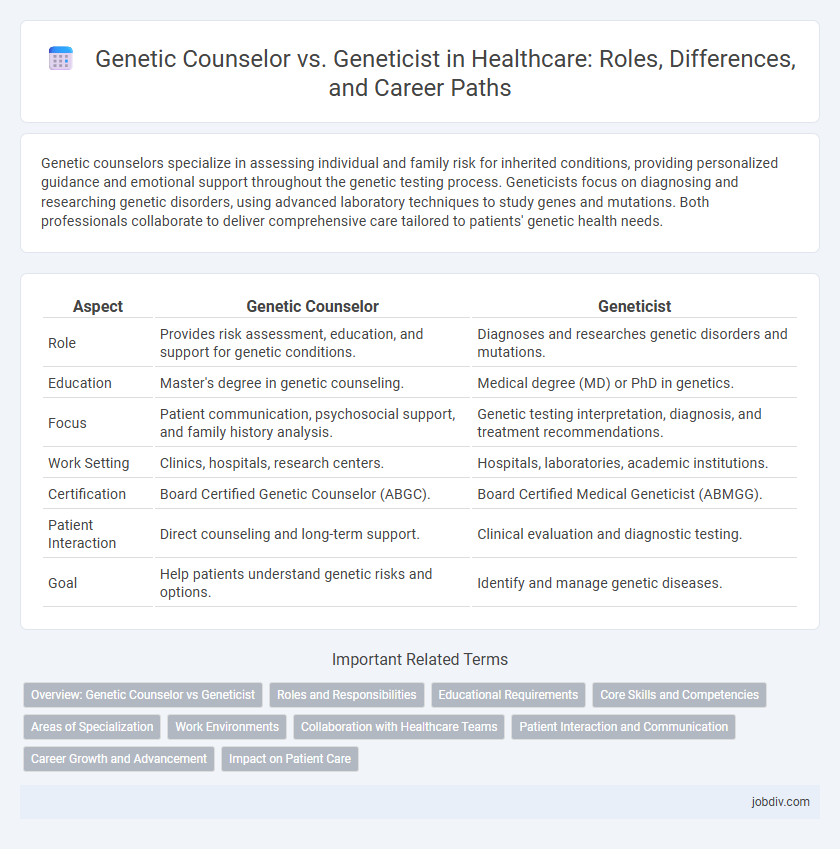Genetic counselors specialize in assessing individual and family risk for inherited conditions, providing personalized guidance and emotional support throughout the genetic testing process. Geneticists focus on diagnosing and researching genetic disorders, using advanced laboratory techniques to study genes and mutations. Both professionals collaborate to deliver comprehensive care tailored to patients' genetic health needs.
Table of Comparison
| Aspect | Genetic Counselor | Geneticist |
|---|---|---|
| Role | Provides risk assessment, education, and support for genetic conditions. | Diagnoses and researches genetic disorders and mutations. |
| Education | Master's degree in genetic counseling. | Medical degree (MD) or PhD in genetics. |
| Focus | Patient communication, psychosocial support, and family history analysis. | Genetic testing interpretation, diagnosis, and treatment recommendations. |
| Work Setting | Clinics, hospitals, research centers. | Hospitals, laboratories, academic institutions. |
| Certification | Board Certified Genetic Counselor (ABGC). | Board Certified Medical Geneticist (ABMGG). |
| Patient Interaction | Direct counseling and long-term support. | Clinical evaluation and diagnostic testing. |
| Goal | Help patients understand genetic risks and options. | Identify and manage genetic diseases. |
Overview: Genetic Counselor vs Geneticist
Genetic counselors specialize in assessing individual and family risk for inherited conditions, offering guidance on genetic testing and interpreting results to support informed healthcare decisions. Geneticists, on the other hand, are medical doctors or scientists who diagnose and treat genetic disorders, often conducting research to understand gene function and mutation impacts. The collaboration between genetic counselors and geneticists ensures comprehensive patient care through diagnosis, risk assessment, and personalized management plans.
Roles and Responsibilities
Genetic counselors specialize in assessing individual and family risk for inherited conditions, providing education, support, and guidance to patients on genetic testing options and implications. Geneticists conduct detailed genetic research, diagnose genetic disorders through laboratory analysis, and develop treatment plans based on molecular findings. Both professionals collaborate to optimize patient care, with counselors focusing on patient communication and geneticists emphasizing clinical and laboratory expertise.
Educational Requirements
Genetic counselors typically hold a master's degree in genetic counseling, which includes extensive training in medical genetics, psychosocial counseling, and risk assessment, along with board certification from the American Board of Genetic Counseling or an equivalent body. Geneticists usually possess a doctoral degree (Ph.D. or M.D.) in genetics or a related field, emphasizing research, clinical genetics, and advanced diagnostic techniques, often followed by specialized fellowships or residencies. Both professions demand rigorous education but differ primarily in focus: counselors blend genetics with patient support, while geneticists concentrate on research and complex genetic analyses.
Core Skills and Competencies
Genetic counselors specialize in patient communication, risk assessment, and ethical considerations, providing guidance on inherited conditions and testing options. Geneticists possess expertise in molecular genetics, cytogenetics, and bioinformatics, analyzing genetic data to diagnose and research genetic disorders. Both roles require strong collaboration skills, but counselors prioritize psychosocial support while geneticists focus on laboratory and clinical research competencies.
Areas of Specialization
Genetic counselors specialize in providing risk assessment, education, and support for individuals and families regarding inherited conditions, often focusing on prenatal, cancer, and pediatric genetics. Geneticists concentrate on diagnosing and researching genetic disorders, with specializations that include clinical genetics, molecular genetics, and cytogenetics. Both professionals play crucial roles in personalized medicine, but geneticists primarily handle laboratory testing and analysis, while genetic counselors focus on patient communication and decision-making support.
Work Environments
Genetic counselors primarily work in clinical settings such as hospitals, fertility clinics, and diagnostic laboratories to provide patient education and risk assessment. Geneticists are often employed in research institutions, academic environments, and biotechnology companies concentrating on genetic research and gene mapping. Both professions collaborate but operate in distinctly different work environments tailored to patient interaction versus scientific investigation.
Collaboration with Healthcare Teams
Genetic counselors and geneticists collaborate closely with healthcare teams to provide comprehensive genetic assessments and personalized patient care. Genetic counselors interpret genetic test results and offer emotional support, while geneticists focus on diagnosing genetic conditions and guiding treatment plans. This interdisciplinary approach enhances patient outcomes through tailored risk evaluation and informed medical decision-making.
Patient Interaction and Communication
Genetic counselors specialize in patient interaction by providing personalized risk assessments, interpreting family histories, and delivering emotionally supportive communication tailored to patient concerns. Geneticists primarily focus on analyzing laboratory results, diagnosing genetic disorders, and developing treatment plans with less direct patient counseling. Effective patient communication in genetic counseling enhances understanding and decision-making, whereas geneticists ensure scientific accuracy and clinical management.
Career Growth and Advancement
Genetic counselors and geneticists both play critical roles in genetics, but career growth for genetic counselors is often marked by expanding responsibilities in patient interaction, ethical guidance, and personalized healthcare planning. Geneticists frequently advance by engaging in research, laboratory management, or specialized clinical roles, contributing to breakthroughs in medical genetics and biotechnology. Both careers offer opportunities for specialization, higher education, and leadership positions, with geneticists typically requiring a PhD or MD while genetic counselors generally hold a master's degree in genetic counseling.
Impact on Patient Care
Genetic counselors provide personalized risk assessments and support to patients, facilitating informed decision-making through clear communication of complex genetic information. Geneticists focus on diagnosing genetic disorders, interpreting test results, and conducting research to identify underlying genetic causes. Together, their collaboration enhances accurate diagnosis, targeted treatment plans, and improved patient outcomes in precision medicine.
Genetic Counselor vs Geneticist Infographic

 jobdiv.com
jobdiv.com